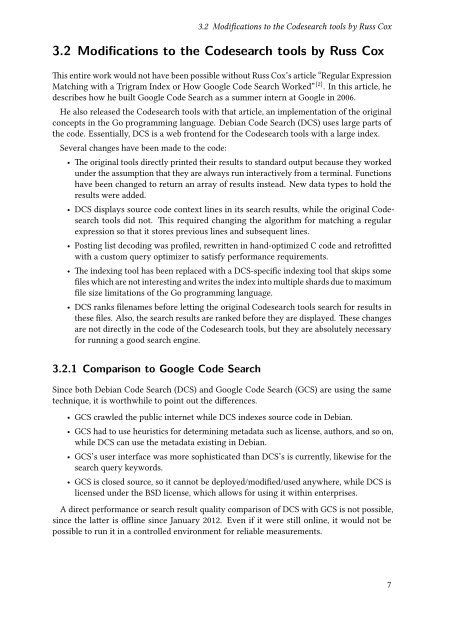Create successful ePaper yourself
Turn your PDF publications into a flip-book with our unique Google optimized e-Paper software.
3.2 Modifications to the <strong>Code</strong>search tools by Russ Cox<br />
3.2 Modifications to the <strong>Code</strong>search tools by Russ Cox<br />
This entire work would not have been possible without Russ Cox’s article “Regular Expression<br />
Matching with a Trigram Index or How Google <strong>Code</strong> <strong>Search</strong> Worked” [2] . In this article, he<br />
describes how he built Google <strong>Code</strong> <strong>Search</strong> as a summer intern at Google in 2006.<br />
He also released the <strong>Code</strong>search tools with that article, an implementation of the original<br />
concepts in the Go programming language. <strong>Debian</strong> <strong>Code</strong> <strong>Search</strong> (DCS) uses large parts of<br />
the code. Essentially, DCS is a web frontend for the <strong>Code</strong>search tools with a large index.<br />
Several changes have been made to the code:<br />
• The original tools directly printed their results to standard output because they worked<br />
under the assumption that they are always run interactively from a terminal. Functions<br />
have been changed to return an array of results instead. New data types to hold the<br />
results were added.<br />
• DCS displays source code context lines in its search results, while the original <strong>Code</strong>search<br />
tools did not. This required changing the algorithm for matching a regular<br />
expression so that it stores previous lines and subsequent lines.<br />
• Posting list decoding was profiled, rewritten in hand-optimized C code and retrofitted<br />
with a custom query optimizer to satisfy performance requirements.<br />
• The indexing tool has been replaced with a DCS-specific indexing tool that skips some<br />
files which are not interesting and writes the index into multiple shards due to maximum<br />
file size limitations of the Go programming language.<br />
• DCS ranks filenames before letting the original <strong>Code</strong>search tools search for results in<br />
these files. Also, the search results are ranked before they are displayed. These changes<br />
are not directly in the code of the <strong>Code</strong>search tools, but they are absolutely necessary<br />
for running a good search engine.<br />
3.2.1 Comparison to Google <strong>Code</strong> <strong>Search</strong><br />
Since both <strong>Debian</strong> <strong>Code</strong> <strong>Search</strong> (DCS) and Google <strong>Code</strong> <strong>Search</strong> (GCS) are using the same<br />
technique, it is worthwhile to point out the differences.<br />
• GCS crawled the public internet while DCS indexes source code in <strong>Debian</strong>.<br />
• GCS had to use heuristics for determining metadata such as license, authors, and so on,<br />
while DCS can use the metadata existing in <strong>Debian</strong>.<br />
• GCS’s user interface was more sophisticated than DCS’s is currently, likewise for the<br />
search query keywords.<br />
• GCS is closed source, so it cannot be deployed/modified/used anywhere, while DCS is<br />
licensed under the BSD license, which allows for using it within enterprises.<br />
A direct performance or search result quality comparison of DCS with GCS is not possible,<br />
since the latter is offline since January 2012. Even if it were still online, it would not be<br />
possible to run it in a controlled environment for reliable measurements.<br />
7


